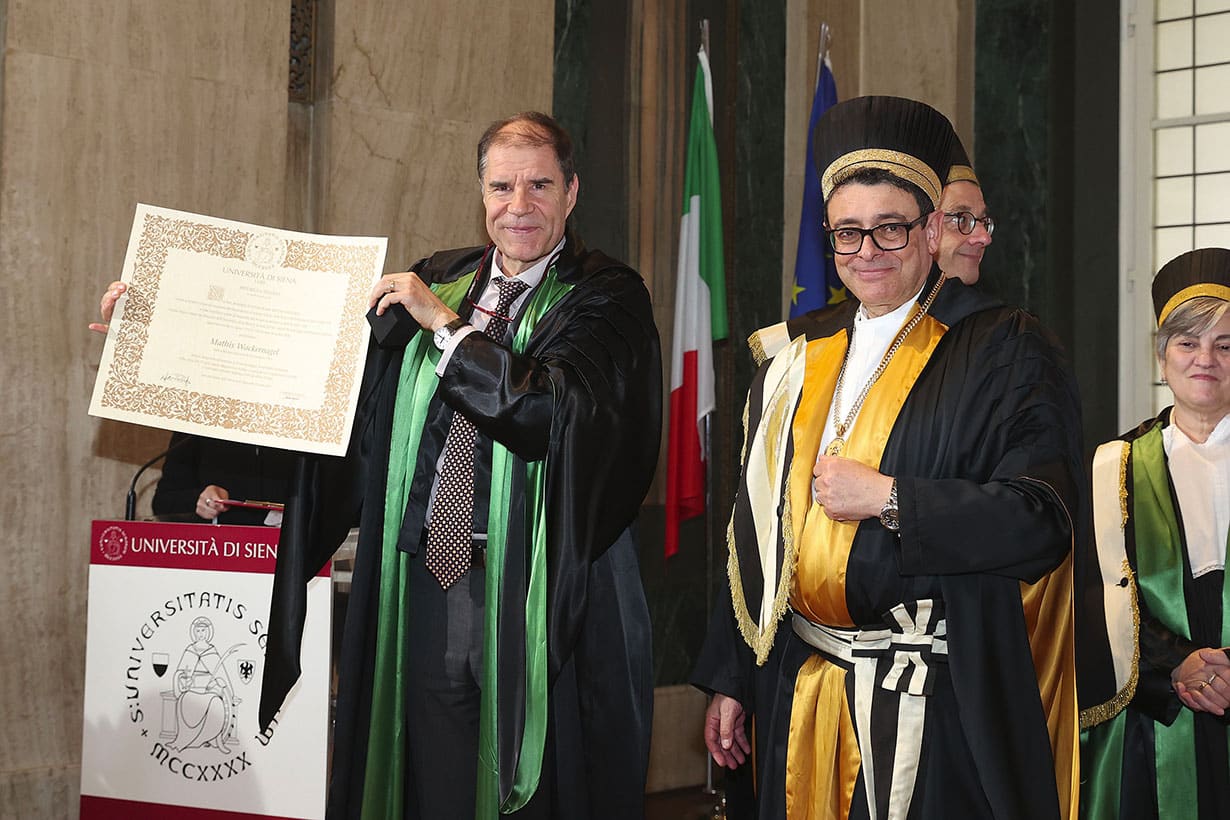On March 21, a ceremony was held at the University of Siena’s Rectorate building to confer an honorary degree in Ecotoxicology and Environmental Sustainability upon scientist Mathis Wackernagel, the Siena academics called “one of the most influential international figures in sustainability”.
The University stated among the accomplishments leading to this honor his co-development of concept of the Ecological Footprint in the early 1990s, an indicator that measures human impact on the environment by estimating the amount of natural resources needed to sustain our lifestyles. Also, they wanted to celebration his co-founding of Global Footprint Network in 2003, as well as the organization’s provision of tools to monitor resource availability (biocapacity) and ecological footprint (Note: the National Footprint and Biocapacity Accounts are now produced through FoDaFo with the help of York University). Among this organization’s initiatives is the annual Earth Overshoot Day, the symbolic date marking when humanity consumes all the biological resources that Earth can regenerate in a year.
The ceremony, held in the Great Hall of the university’s Rectorate, began in the morning with an academic procession with all the deans of the university.
University Rector Roberto Di Pietra opened the event by honoring the new graduate:
“I extend my sincere gratitude to our guest for his presence and for what his personal and scholarly journey represents for us, for our era, and for a world that has lost its ‘sense of measure’ on this planet. Mathis Wackernagel’s research has the merit of clearly demonstrating how much humanity is consuming Earth’s resources and at what intensity. This information should concern everyone—individuals, national and international institutions alike. It should drive better resource management, influence behavioral changes, and guide strategic decisions. Yet almost none of this is happening. In many international forums, discussions are dominated by a paradoxical argument: some nations claim the right to exploit resources excessively (even asserting a ‘right to pollute’) simply because Western countries did so for decades. How can we define this attitude of humanity toward its own planet? It is arrogance—a collective arrogance reminiscent of the myth of Phaethon and the Chariot of Fire, as our Emeritus Professor Maurizio Bettini recently wrote. Institutions like ours, the University of Siena, must act for the future. We must continue to educate, research, and share knowledge, especially when arrogance grows stronger. We must defend and stand up for science, which is under attack today. Awarding this honorary degree to Mathis Wackernagel reaffirms our university’s commitment to sustainability. We are proud to now count him among our alumni. Thank you, Mathis, for your presence and your lectio magistralis.”
This was followed by the reading of the degree citation by Professor Riccardo Paoletti, Director of the Department of Physical, Earth, and Environmental Sciences, and the laudatio by Professor Simone Bastianoni, the Rector’s Delegate for Sustainability.
Professor Paoletti stated:
“Dr. Wackernagel co-invented the Ecological Footprint, a cornerstone of sustainability studies and an inspiration for much of our university’s research. These themes are integrated into our courses, theses, and doctoral dissertations.”
Professor Bastianoni added:
“Mathis Wackernagel has played a pivotal role in sustainability science by creating an indicator that assesses humanity’s environmental impact. He established Overshoot Day (August 1 in 2024), the date when humanity exhausted Earth’s regenerative capacity for that year. Through the Global Footprint Network, he also recognized Siena’s Carbon Neutrality Alliance as one of 100 leading examples of sustainable action.”
Wackernagel then delivered his lectio magistralis, titled “How Predictable Is Our Future?”
“The future is never entirely predictable, but today we can anticipate many trends. This knowledge helps us make wiser choices. What forces shape the future, and how can we measure them?”
Reflecting on the honor, Wackernagel said:
“I am deeply moved and grateful. Being recognized by Siena is especially meaningful, not only for its centuries-old academic tradition but also for its pioneering contributions to my field, like those of Enzo Tiezzi, who applied thermodynamics to social systems. Collaborations with Siena’s Ecodynamics Group and its brilliant students have created enduring bonds. I feel part of this community.”
The ceremony concluded with performances by the University Choir, directed by Professor Elisabetta Miraldi.
The entire ceremony can be seen here.



